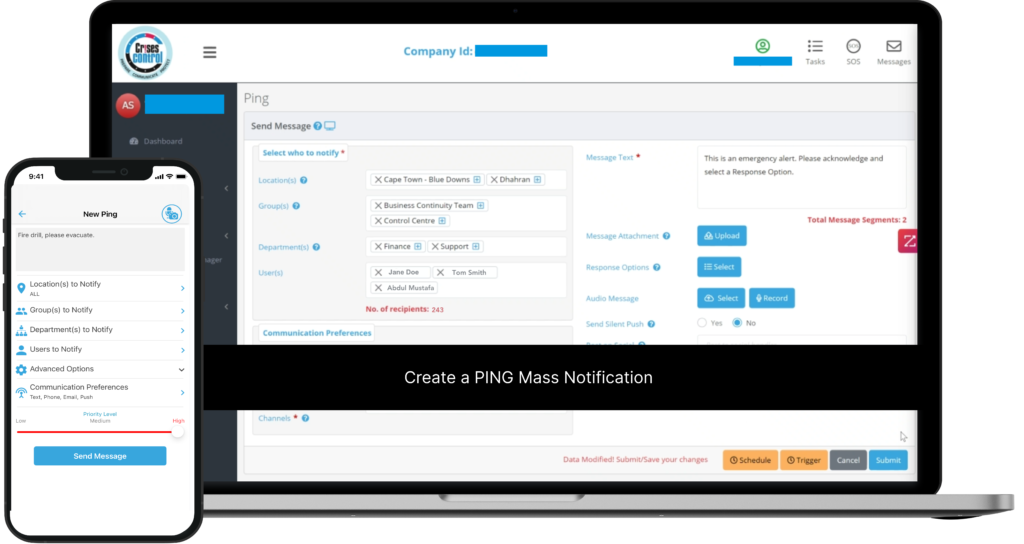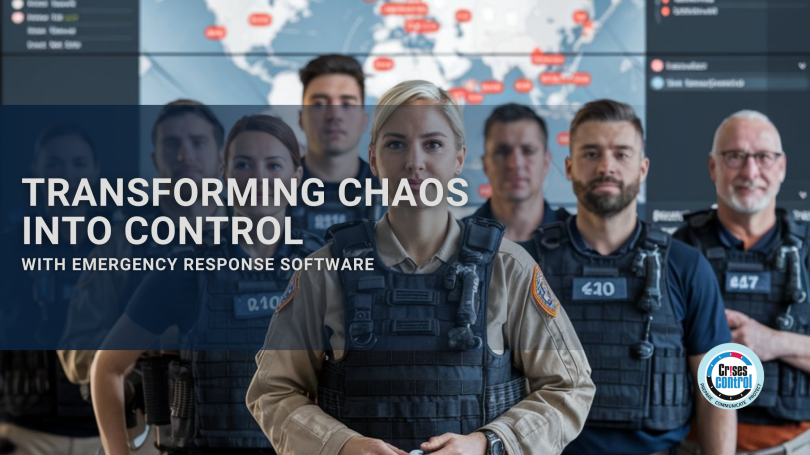Written by Ikram Tassi | Marketing
Emergencies, by their very nature, strike without warning, often leaving businesses scrambling to respond. Whether it’s a natural disaster, a cybersecurity threat, or an infrastructure failure, the ability to act swiftly can mean the difference between manageable disruption and catastrophic loss. For organisations seeking to protect their people, operations, and reputation, Emergency Response Software has become indispensable.
This technology equips businesses with the tools to respond decisively, ensuring clear communication, streamlined coordination, and rapid recovery. One such leader in this space is Crises Control, whose robust suite of features addresses the unique challenges of modern crisis management.
Why Is Emergency Response Software Crucial?
Emergencies put tremendous pressure on businesses, revealing gaps in communication, decision-making, and resource allocation. Without a proper system, the following issues are common:
- Delays in Communication: A fragmented approach to alerts—such as relying solely on emails or phone trees—leads to confusion and missed information.
- Disjointed Coordination: Misaligned efforts across teams and locations can exacerbate the crisis, wasting valuable time.
- Operational Downtime: The longer a crisis goes unaddressed, the higher the financial and reputational toll.
Emergency Response Software resolves these pain points by integrating alert systems, automation, and real-time coordination into a single, seamless platform.
How Emergency Response Software Transforms Crisis Management
1. Instant and Reliable Communication
When every second counts, slow or incomplete communication can escalate the situation. Traditional methods, such as email or manual phone chains, are unreliable in urgent scenarios. Emergency Response Software eliminates these inefficiencies by delivering messages instantly through multiple channels.
The Crises Control Edge:
- The Ping Mass Notification System sends alerts via SMS, email, voice calls, and mobile app notifications, ensuring messages reach all employees regardless of their location.
- Geo-targeting capabilities allow businesses to send location-specific alerts, ensuring that those affected receive critical instructions while others are not unnecessarily alarmed.
2. Automation for Efficiency and Speed
Emergencies unfold rapidly, leaving no room for manual delays. Predefined workflows in emergency response systems ensure swift, automated actions during critical moments. This means alerts are triggered immediately, enabling faster decision-making and coordination.
Crises Control Automation Highlights:
- Alerts can be configured to trigger automatically based on predefined events, such as fire alarms, severe weather warnings, or IT system breaches.
- Escalation protocols ensure that if a recipient fails to acknowledge an alert, it is resent through alternative channels or escalated to other team members.
3. Two-Way Communication for Better Insights
During a crisis, knowing your team’s status is just as important as delivering instructions. Two-way communication allows employees to respond to alerts, confirm their safety, or request assistance. This creates a feedback loop that helps crisis managers allocate resources effectively.
How Crises Control Enhances Communication:
- Employees can confirm they’ve received and understood instructions.
- The SOS Panic Button enables employees to signal distress, helping the organisation provide immediate support.
4. Integrated Incident Management
While sending alerts is crucial, managing the broader crisis response requires more than just notifications. Crises Control’s Incident Manager connects communication tools to actionable workflows, ensuring coordinated efforts across teams.
Features That Make a Difference:
- Predefined action plans help teams respond consistently and effectively.
- Real-time tracking provides visibility into progress, allowing adjustments as needed.
5. Adaptability for Modern Workforces
With remote and hybrid work models becoming the norm, organisations must account for employees who are dispersed across locations. Emergency Response Software ensures that no one is left out, regardless of where they are.
Crises Control’s Mobile-First Approach:
- The Crises Control app allows users to receive alerts, respond, and access incident updates from anywhere.
- Features like geo-fencing enable location-specific actions, such as alerting only those in an affected region.
Interested in our Ping Mass Notification System?
Efficiently alert everyone in seconds at scale with our Mass Notification System – PING, get the message out fast and ensure rapid response and recovery.

The Business Continuity Advantage
Beyond immediate response, Emergency Response Software is a cornerstone of business continuity planning. It supports long-term resilience by ensuring that crises are managed effectively, with minimal disruption to operations.
Key Benefits:
- Enhanced Preparedness: Predefined workflows and automated alerts ensure your organisation is always ready.
- Faster Recovery: Real-time tracking and coordination enable quicker restoration of normal operations.
- Data for Improvement: Comprehensive reporting helps businesses evaluate their response and refine future plans.
Why Crises Control Is the Ultimate Solution
Crises Control isn’t just another emergency response tool—it’s a comprehensive platform designed to address the specific needs of modern organisations. Here’s why businesses choose Crises Control:
- Comprehensive Communication: Multi-channel messaging ensures everyone stays informed.
- Intuitive Automation: Predefined triggers and escalation paths reduce response times and eliminate human error.
- User-Friendly Design: An easy-to-use interface ensures quick adoption, even during high-stress situations.
- Customisable Workflows: Tailor alerts and response plans to meet your organisation’s unique requirements.
- Seamless Integration: Crises Control works with existing systems, making it a hassle-free addition to your crisis management toolkit.
Conclusion: Act Now to Secure Your Organisation’s Future
Emergencies are inevitable, but disorganisation doesn’t have to be. With the right tools, businesses can transform their crisis response from chaotic to controlled. Crises Control’s Emergency Response Software provides everything you need to safeguard your people, maintain business continuity, and emerge stronger from any challenge.
Don’t wait for a crisis to reveal your vulnerabilities. Contact us today for a free demo and discover how their innovative solutions can prepare your organisation for the unexpected.
Request a FREE Demo

